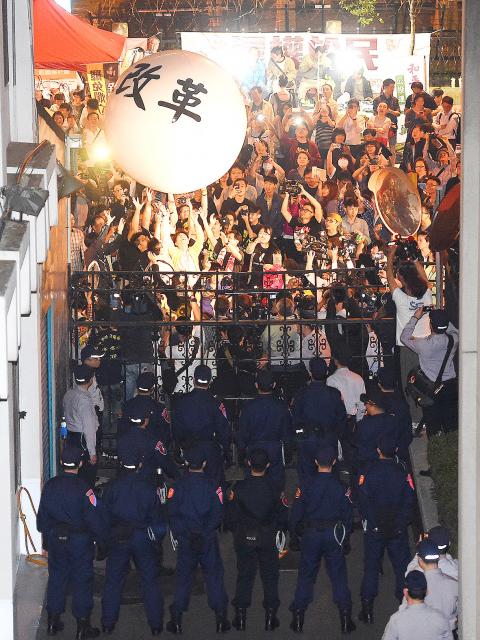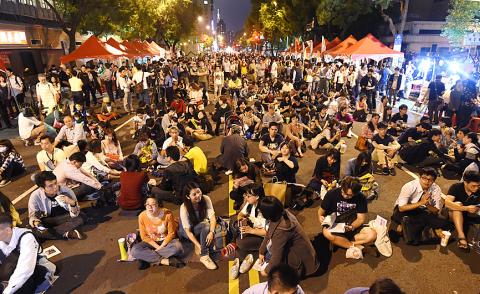Multiple rallies were held across Taipei yesterday as the nation commemorated the first anniversary of the Sunflower movement, marking the day when student-led protesters first began to lay siege to the Legislative Yuan in the capital over the government’s handling of a proposed cross-strait service trade agreement.
The participants revisited demands made during last year’s landmark protests, in which activist groups occupied the Legislative Yuan’s main chamber for almost 23 days, while tens of thousands of demonstrators were encamped outside the legislative compound.
While centered on continued concern about relations with China, the protesters also expressed diverse demands for political reform, spearheaded by youth activist groups that blossomed in the aftermath of the Sunflower movement.

Photo: Liao Chen-huei, Taipei Times
At the largest rally, more than 1,000 demonstrators returned to Jinan Road next to the legislative compound last night to show their support for the activist groups.
The event featured speeches by prominent social activists, as well as more than a dozen stands promoting the ideas of various social movements, ranging from groups calling for reform of the Constitution to petition drives aimed at amending the Referendum Act (公民投票法).
As the activists commemorated the Sunflower movement, Mainland Affairs Council Minister Andrew Hsia (夏立言) hosted a live public hearing online, in a bid to promote the Chinese Nationalist Party’s (KMT) proposed version of a cross-strait oversight bill.

Photo: Liao Chen-huei, Taipei Times
The passage of a cross-strait oversight bill was the primary demand of the Sunflower movement, after Chinese Nationalist Party (KMT) Legislator Chang Ching-chung (張慶忠) sparked a public outcry when he attempted to ram through a preliminary reading of the service trade pact in about 30 seconds.
Human rights lawyer Lai Chung-chiang (賴中強), one of the most vocal critics of President Ma Ying-jeou’s (馬英九) administration, said that the government’s version of the cross-strait oversight bill is “designed to prevent any meaningful oversight.”
He urged the public to visit a Web site launched by activist groups, where netizens would be able to express their views on eight proposed versions of the oversight bill through a series of detailed questionnaires.

Photo: Chu Pei-hsiung, Taipei Times
At one point during the demonstration, protesters pushed a large balloon over the walls of the legislative compound with the words “constitutional reform” etched across it.
Members of the Civic Alliance to Promote Constitutional Reform urged comprehensive reforms to the Constitution, saying that the Sunflower movement illustrated serious flaws in the nation’s political institutions.
The rally drew a diverse crowd, with protesters sitting on the ground to participate in the event.
One protester, a man in his 20s surnamed Yang (楊) who works in the restaurant industry, said that the movement was important because it disrupted the pace at which the government was carrying out negotiations with China.
He said the movement created an impact among the younger generation, as more people are now willing to show their support for social movements and underprivileged groups.
Another supporter, surnamed Hsiao (蕭), showed up at the rally with his three-year-old daughter.
He said the movement encouraged him to participate in politics by getting involved in a ballot-watching campaign during the nine-in-one elections last year.
At a separate rally earlier in the day, student activist Chen Wei-ting (陳為廷), who played a leading role in the Sunflower movement along with fellow activist Lin Fei-fan (林飛帆), said that the Ma administration has continued to promote closer ties with China.
“We all know that the Ma administration does not just want to implement the cross-strait service trade agreement or continue economic negotiations; what follows is a push for a meeting between Ma and [Chinese President] Xi Jinping (習近平), as well as political negotiations,” Chen said.
Looking back on last year’s protests, Chen said that the decisionmaking process throughout the movement lacked democratic participation among its members, adding that the “deification” and increased public attention on the leaders of the movement should be re-examined.
Chen has disappeared from the public eye since December last year, after a series of sexual harassment scandals surfaced, marking an abrupt end to his 17-day legislative campaign in the Miaoli by-election.
The embattled activist participated in a smaller rally earlier in the day led by former Democratic Progressive Party chairman Lin I-hsiung (林義雄), in which about 200 members of the People Rule Foundation marched around the Legislative Yuan.
Wearing their signature bamboo hats, the protesters made seven laps of the Legislative Yuan compound in silence, in reference to the biblical Battle of Jericho, in which the walls of Jericho were said to have crumbled after the Israelite army marched seven times around the city.
Academia Sinica researcher Huang Kuo-chang (黃國昌) said campaigns led by youth activist group Taiwan March, which grew out of the Sunflower movement, aimed to tackle problems inherent in the nation’s political institutions — such as the failure of legislators to respect public opinion.
He urged the public to continue to support activists’ drive to reform the Referendum Act to ensure that the public have a say in political decisions.

NATIONAL SECURITY THREAT: An official said that Guan Guan’s comments had gone beyond the threshold of free speech, as she advocated for the destruction of the ROC China-born media influencer Guan Guan’s (關關) residency permit has been revoked for repeatedly posting pro-China content that threatens national security, the National Immigration Agency said yesterday. Guan Guan has said many controversial things in her videos posted to Douyin (抖音), including “the red flag will soon be painted all over Taiwan” and “Taiwan is an inseparable part of China,” while expressing hope for expedited “reunification.” The agency received multiple reports alleging that Guan Guan had advocated for armed reunification last year. After investigating, the agency last month issued a notice requiring her to appear and account for her actions. Guan Guan appeared as required,

A strong cold air mass is expected to arrive tonight, bringing a change in weather and a drop in temperature, the Central Weather Administration (CWA) said. The coldest time would be early on Thursday morning, with temperatures in some areas dipping as low as 8°C, it said. Daytime highs yesterday were 22°C to 24°C in northern and eastern Taiwan, and about 25°C to 28°C in the central and southern regions, it said. However, nighttime lows would dip to about 15°C to 16°C in central and northern Taiwan as well as the northeast, and 17°C to 19°C elsewhere, it said. Tropical Storm Nokaen, currently

‘NATO-PLUS’: ‘Our strategic partners in the Indo-Pacific are facing increasing aggression by the Chinese Communist Party,’ US Representative Rob Wittman said The US House of Representatives on Monday released its version of the Consolidated Appropriations Act, which includes US$1.15 billion to support security cooperation with Taiwan. The omnibus act, covering US$1.2 trillion of spending, allocates US$1 billion for the Taiwan Security Cooperation Initiative, as well as US$150 million for the replacement of defense articles and reimbursement of defense services provided to Taiwan. The fund allocations were based on the US National Defense Authorization Act for fiscal 2026 that was passed by the US Congress last month and authorized up to US$1 billion to the US Defense Security Cooperation Agency in support of the

PAPERS, PLEASE: The gang exploited the high value of the passports, selling them at inflated prices to Chinese buyers, who would treat them as ‘invisibility cloaks’ The Yilan District Court has handed four members of a syndicate prison terms ranging from one year and two months to two years and two months for their involvement in a scheme to purchase Taiwanese passports and resell them abroad at a massive markup. A Chinese human smuggling syndicate purchased Taiwanese passports through local criminal networks, exploiting the passports’ visa-free travel privileges to turn a profit of more than 20 times the original price, the court said. Such criminal organizations enable people to impersonate Taiwanese when entering and exiting Taiwan and other countries, undermining social order and the credibility of the nation’s